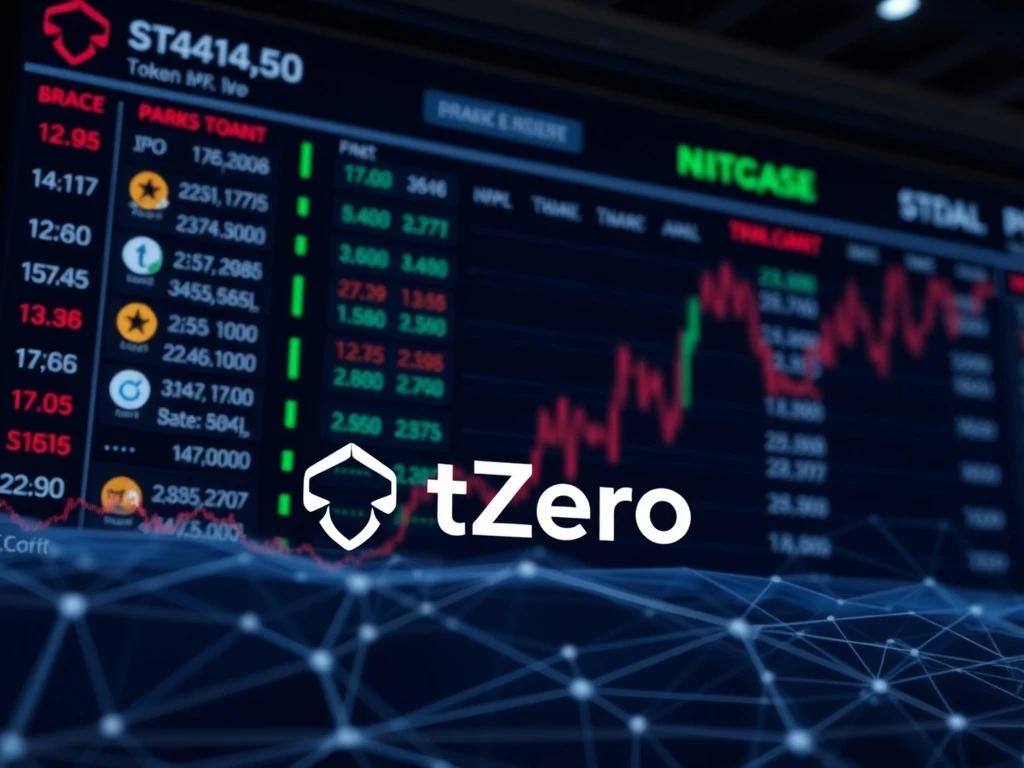TZero IPO: **Transformative** Tokenization Platform **Eyes** 2026 Public Listing

The digital asset landscape is buzzing with significant news. Leading **tokenization platform** tZero has announced its ambitious plan for a 2026 initial public offering (IPO). This move signals a pivotal milestone for the blockchain industry. It further highlights the growing maturity of the cryptocurrency market. Investors keenly watch this development. It could reshape how traditional assets integrate with decentralized finance. The planned tZero IPO marks a truly transformative moment for digital securities.
TZero’s Vision: Pioneering the Tokenization Platform Landscape
TZero Group, a New York-based blockchain infrastructure company, specializes in tokenized securities and real-world assets. The company recently disclosed plans for a United States IPO in 2026. Founded in 2014, tZero assists companies in raising capital. It also facilitates the trading of securities on blockchain-based platforms. These operations strictly adhere to US securities laws, including private offerings.
CEO Alan Konevsky informed Bloomberg that tZero is actively engaged in discussions with several banks. However, it has not yet selected an underwriter. Konevsky also noted that tZero employs just over 50 people. The company is not yet profitable. It may pursue an additional funding round before its public listing. Ultimately, this strategy aims to strengthen its financial position ahead of the IPO.
Tokenization involves converting real-world assets into digital tokens on a blockchain. These assets include fiat currencies, stocks, and real estate. This process enables 24/7 online trading. TZero believes asset tokenization will play a central role. It promises to make capital formation and cross-border transactions significantly more efficient. The company itself lists its own tokenized shares. It has successfully raised approximately $200 million, according to Konevsky. Notably, Intercontinental Exchange (ICE), owner of the New York Stock Exchange (NYSE), is a significant tZero investor. This backing underscores the potential of their tokenization platform.
The Accelerating Crypto IPO Wave
A growing trend sees numerous crypto companies moving toward public markets. This phenomenon reflects increasing confidence in the sector. Several prominent players have already debuted or are preparing for public listings. This crypto IPO wave indicates a maturing industry. It suggests greater acceptance by mainstream finance.
- Circle: The stablecoin issuer debuted on the NYSE in June. It launched with an upsized IPO exceeding $1.05 billion. Its stock soared 167% on the first day of trading.
- Bullish: This crypto exchange, also parent company of CoinDesk, went public on the NYSE in August.
- Gemini: The exchange founded by Cameron and Tyler Winklevoss made its trading debut on the Nasdaq in September. This occurred after increasing its IPO valuation days earlier.
- Kraken: Reports suggest Kraken is pursuing a 2026 listing. The company raised $500 million in September at a $15 billion valuation. This fuels further speculation about its impending IPO.
These successful and anticipated listings underscore a clear market appetite. Investors are increasingly interested in blockchain-native businesses. Consequently, the public market provides substantial capital for growth. This trend also brings enhanced transparency and regulatory oversight to the crypto space.
Navigating US Crypto Regulations: A Catalyst for Public Listings
Greater regulatory clarity in the United States has significantly encouraged crypto companies to go public. For instance, the passage of the GENIUS Act in July marked a key legislative development. This act aims to provide a clearer framework for digital assets. Furthermore, the generally pro-crypto stance of the Trump administration has instilled more confidence. This environment helps foster a more predictable operating landscape for crypto businesses. Consequently, companies feel more comfortable pursuing public listings.
Regulatory frameworks, while sometimes perceived as restrictive, often provide necessary legitimacy. They help attract institutional investors. These investors typically require robust compliance standards. The evolving landscape of US crypto regulations offers a path for crypto firms to integrate with traditional financial systems. This integration helps bridge the gap between innovative blockchain technology and established markets. Ultimately, clearer rules reduce uncertainty. They promote investment and foster innovation within the digital asset sector.
Strengthening Blockchain Infrastructure: TZero’s Strategic Public Offering
TZero’s decision to pursue an IPO aligns with its long-term strategy. The company aims to solidify its position as a crucial piece of the global blockchain infrastructure. By going public, tZero seeks to gain access to broader capital markets. This capital can fund further development and expansion. It will enable the company to enhance its technology. It will also help scale its operations. This move also increases public visibility and credibility. These factors are vital for attracting new clients and partners in the evolving digital securities landscape.
A successful tZero IPO would validate its business model. It would also highlight the growing importance of tokenized assets. TZero’s platform offers a regulated environment for trading digital securities. This differentiates it from many other crypto ventures. The company’s focus on compliance under US securities laws makes it an attractive proposition. It appeals to institutional investors seeking exposure to blockchain without regulatory ambiguities. The planned public offering reinforces tZero’s commitment. It underscores its dedication to building robust, compliant digital market infrastructure.
The Future of Digital Securities and Tokenization
The convergence of traditional finance and blockchain technology is accelerating. TZero’s IPO represents a significant step in this evolution. It demonstrates how tokenization can revolutionize capital markets. The ability to fractionalize ownership of high-value assets, such as real estate or private equity, opens new investment avenues. Moreover, blockchain technology ensures transparency and efficiency in these transactions. The tokenization platform model promises lower costs and faster settlement times. This contrasts sharply with traditional financial systems.
Ultimately, the success of companies like tZero will pave the way. It will encourage more enterprises to explore tokenized offerings. The broader acceptance of digital securities will likely lead to a more interconnected global financial system. This system will operate 24/7. It will be more accessible to a wider range of investors. As US crypto regulations continue to mature, we can expect further innovation. We will also see greater adoption of blockchain-based financial products. TZero stands at the forefront of this exciting transformation, building essential blockchain infrastructure for the future.







